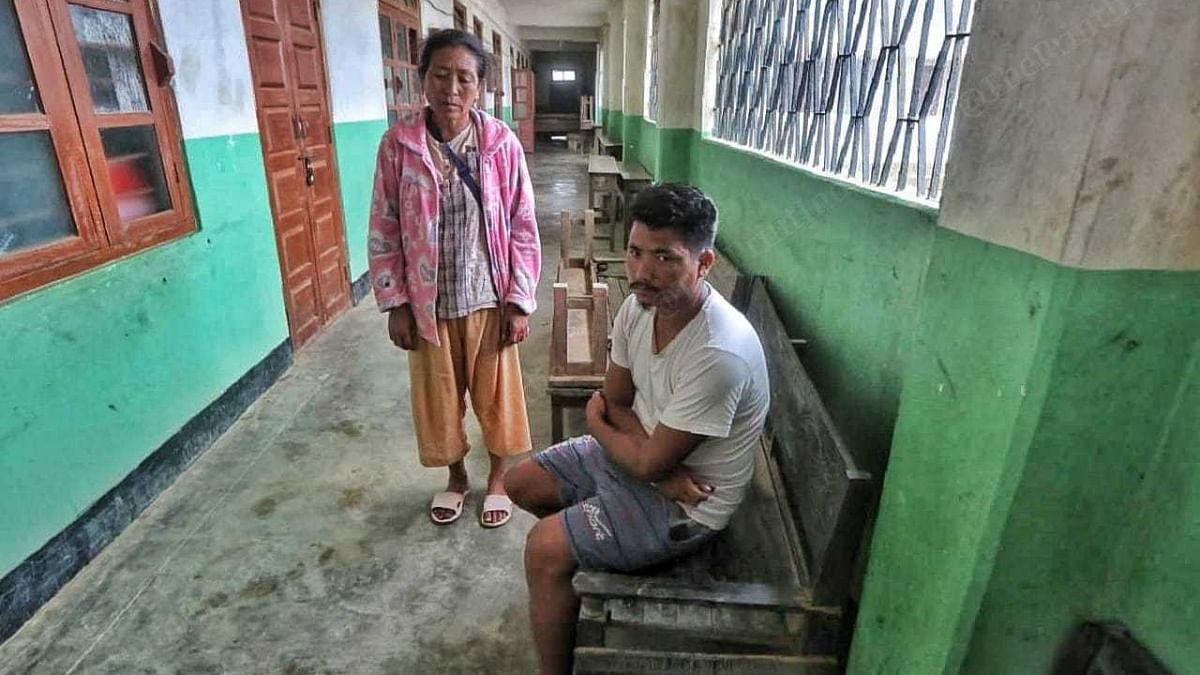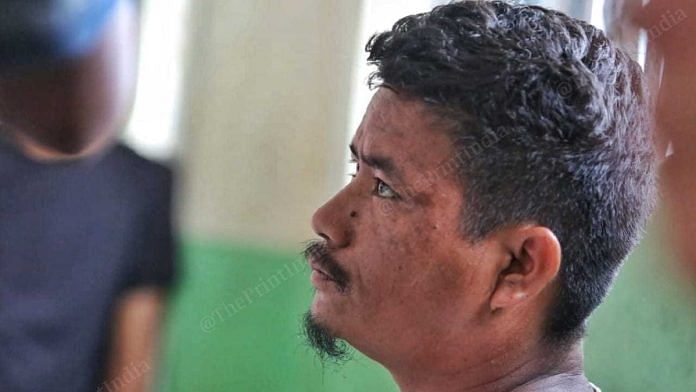Tengnoupal: For thirty-five-year-old Albert Vaiphei, the night of 4 May was the longest ever. Armed with petrol bombs, as a mob approached his house in Salam Pattong — a Kuki-dominated village in Manipur’s Kangpokpi district — Albert panicked. He told his parents to pack whatever they could carry and rush out.
Barely 50 metres on, Albert’s father Kambem Vaiphei, who was in his late 60s, collapsed. When Albert tried to wake him up, he couldn’t feel a heartbeat. His father passed away.
But there was no time to mourn.
Without missing a beat, Albert hauled his father’s lifeless body over his shoulders, and continued to walk with his mother, also in her 60s, by his side. For Albert, leaving his father behind was not an option. And neither was not giving him a respectful final farewell.
Despite the violence in the state, Albert eventually returned to his village and buried his father at the very place he was born. To get there, he had carried the body 17 km uphill, spent a night in a jungle, and gone against the advice of his own community, who told Albert to bury his father in another village.
“I still feel that weight on my shoulders,” he says, now sitting in a relief camp set up for displaced Kukis at Saint Peter school in Tengnoupal district of Manipur, his mother, Niangboi Vaiphei, with him.
It has been two months since the violence began in Manipur on 3 May, but the clashes continue between the Kukis dominating the Hill districts, and Meiteis, who form the majority in the Valley. The violence has claimed over 155 lives and displaced over 50,000 people, police data shows.
While the Kukis were driven out of the Valley and the foothills, the Meiteis staying in the Hills also fled their homes for the Valley.
In Imphal, the Kukis were weeded out through their I-cards in colleges, workplaces and then subjected to beatings and left to die, sources in the security establishment told ThePrint. In villages that fall in the foothills, they were driven out and their houses were then looted, burnt and razed to the ground using JCBs, they said.
Also read: Why Biren bid to raze bunkers has sparked unease in Manipur — ‘villages attacked almost daily’
A long night
As Albert picked up his father’s body and rushed out, he was slowed down by its weight.
Other Kuki families, who too were fleeing Salam Pattong, which lies in the foothills, asked him to “be practical”, leave the body by the roadside, and rush to save his mother and himself. But he just could not, he says.
“I have never felt so helpless,” he says, his eyes pale and cold. “I was shouting for help, but no one came. Instead, they asked me to leave the body behind.”

“How could I have left my father’s body back there? Just for that mob to desecrate it and disrespect him? Never,” he adds.
For Albert, stopping was not an option. After climbing for hours, they reached a jungle. He looked for a safe spot behind a bush where he placed the body and sat beside it.
“I kept looking at him as he lay there lifeless,” he says. “My mother was crying, we had lost our home, my father was dead, but I could not feel a thing.”
While they were in the jungle that night, Albert kept a vigil to ensure their safety.
After resting for a while, he again picked up his father’s body and started the climb, till they reached the place where most people from their village had taken refuge, in small villages inside the jungle.
“It was drizzling, my father’s body was on my shoulder, my mother beside me and we kept walking. That was the longest night. The sun was refusing to come out,” he says.
‘Father died of shock’
In the morning, Albert was advised that he should bury the body either in the jungle or a cemetery in one of the adjoining villages, but he was not convinced.
For Albert, to lay his father to rest in the village that was their home became non-negotiable. He kept sitting beside the body for hours, refusing to bury it.
“Everyone from my village kept telling me that I should bury my father in the jungle, but my heart did not approve of it,” he says.
“That night, when my father left home, he was so affected by what he saw around him that he died of shock. That is how much he loved his home. I could not save his home or his life, but I thought that the least I could do is to lay him to rest in his own village.”
“How could I disrespect him by burying him in a jungle or a place where he does not belong?” he says.
Albert says at that point his decision was made. “I told them I don’t care if I am burnt alive (in the process), at least I would know I tried. I can’t explain what was going on inside me.”
After several rounds of discussions with the villagers, when Albert refused to budge, a group of 30 men from his community agreed to accompany him to the village cemetery and ensure that the burial was done. The men decided that they would leave the jungle in the early hours and return as soon as possible.
A security cordon & the burial
The Kuki group started for Salam Pattong early on 6 May, at a time when violence was at its peak. Albert again had his father’s body on his shoulders.
As the men reached the village, most of which was destroyed, they formed a security cordon to ensure that the burial was done without any hindrance.
“We reached the cemetery and the men who came with me took positions to ensure that no one attacked us. I said a short prayer and buried him. Just like how the head of the family should be given a farewell,” he says.
For Albert, that was the moment he realised what he had lost. “That is when it struck me that he is dead,” he says.
As Albert and the others left the village, all they could see around was destruction. The houses were burnt, some razed to the ground, with smoke still emanating from the destroyed structures.
On his way, Albert crossed his home. But he did not look back or try to go inside to see what was left of it. “I did not have the courage,” he says.
(Edited by Smriti Sinha)
Also read: ‘Peacekeeping’ forces, mistrust, lack of political will — why Manipur has failed to disarm rioters



